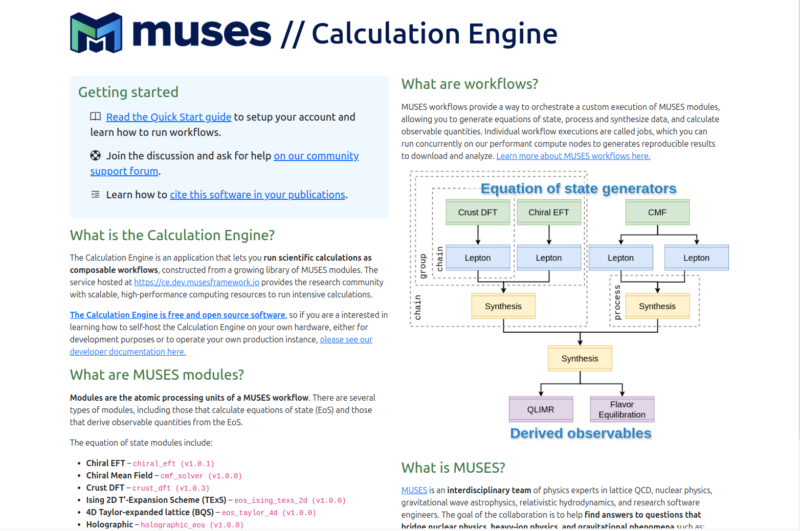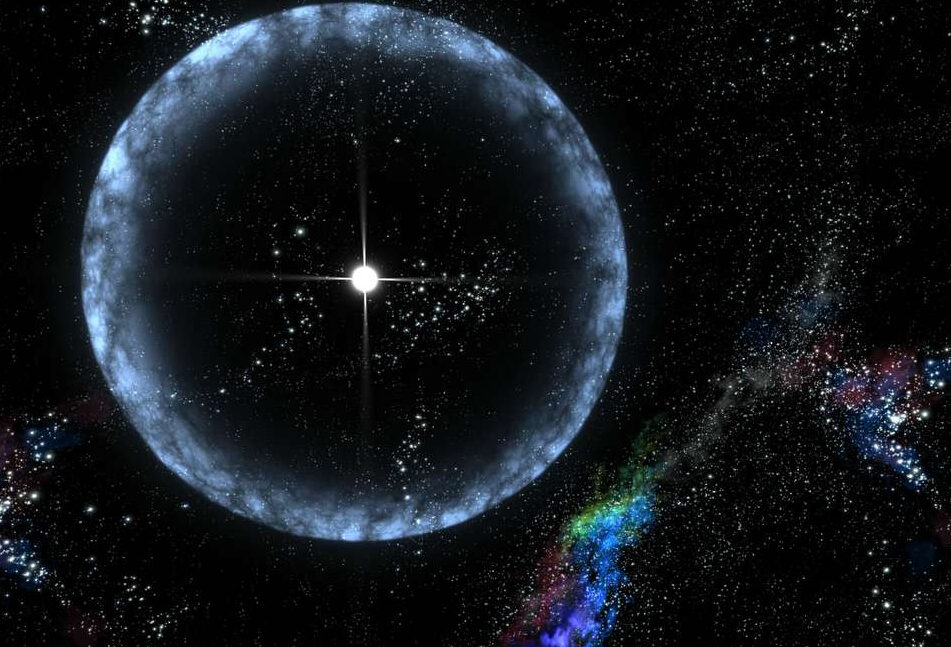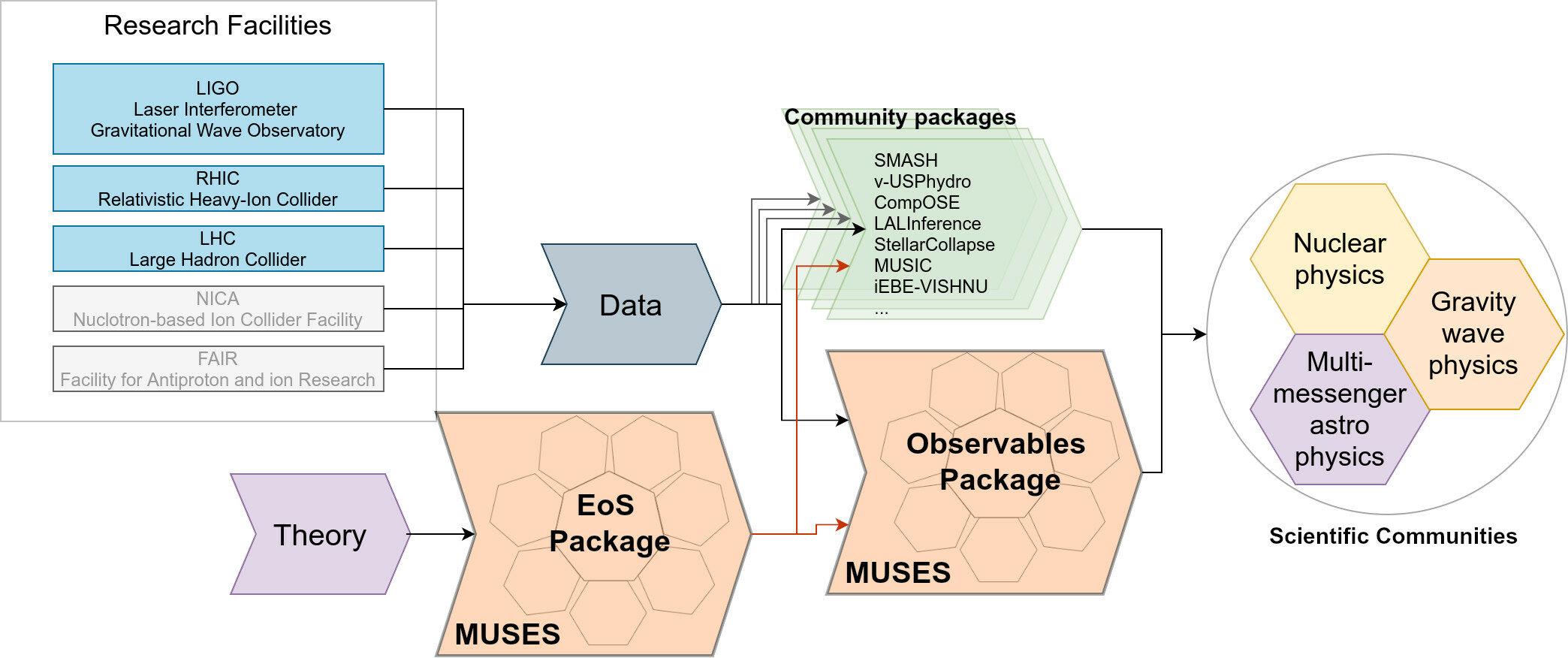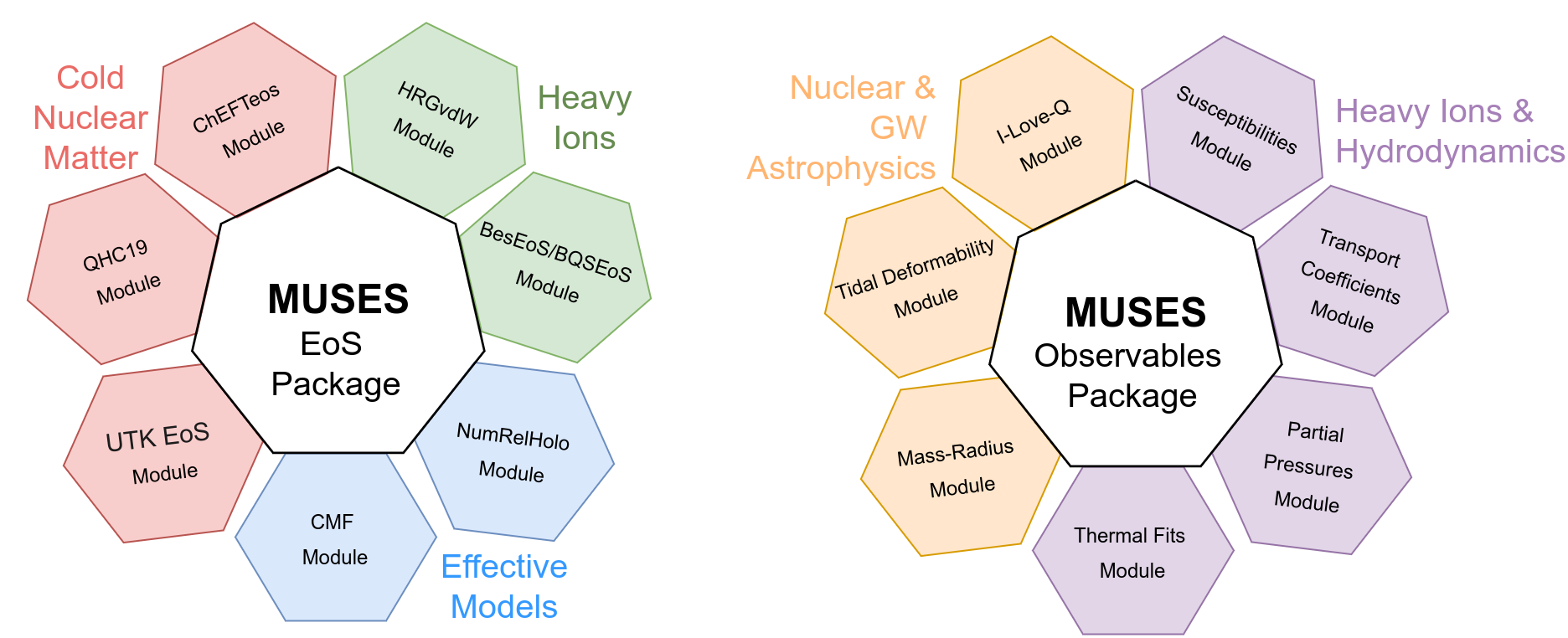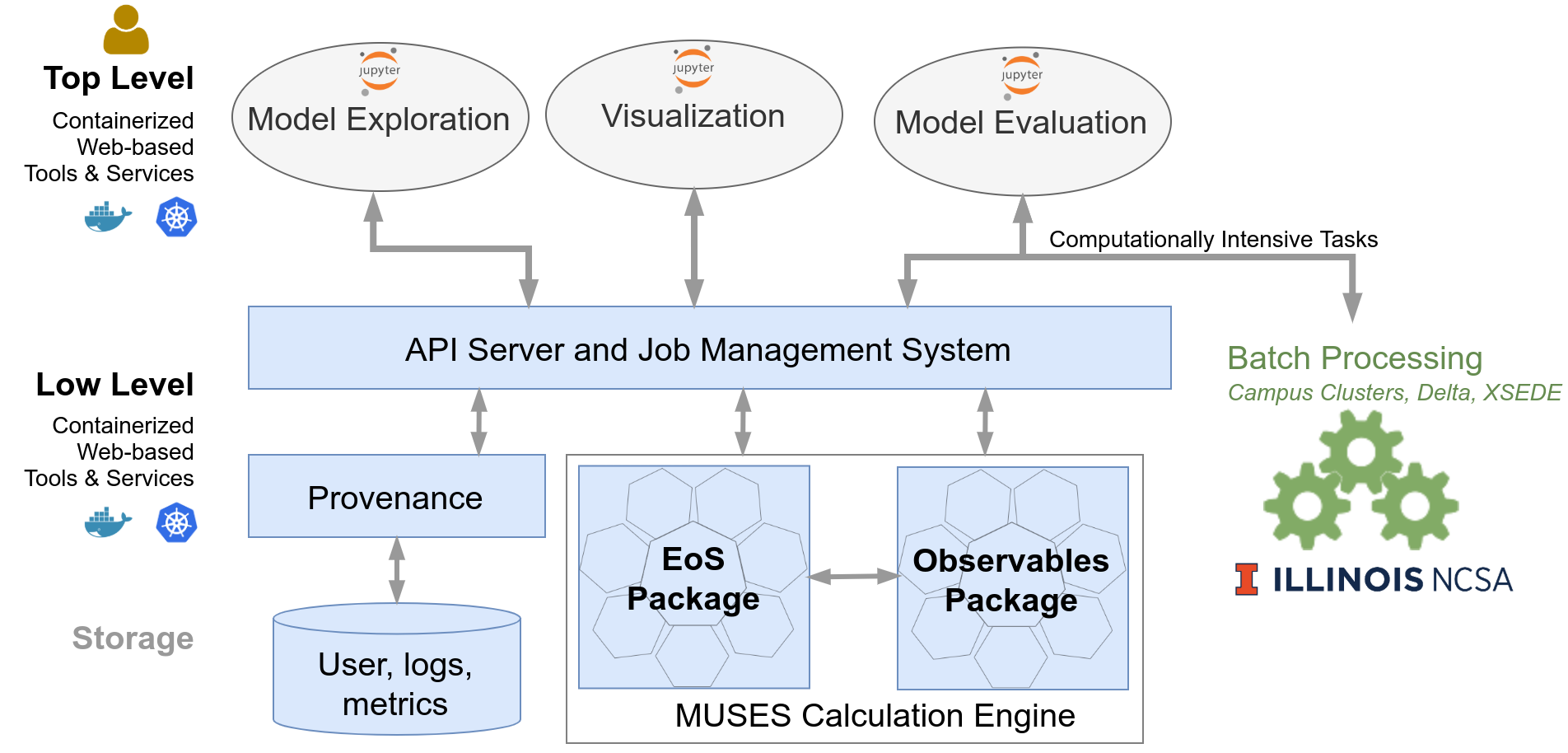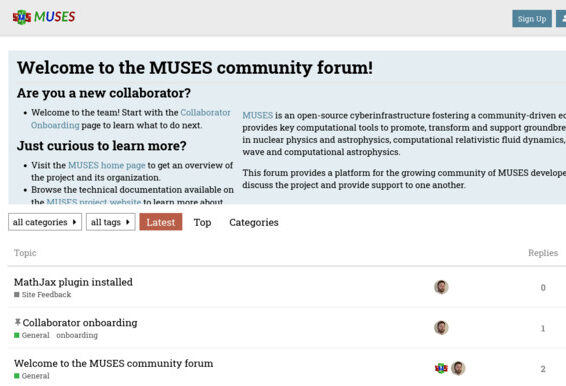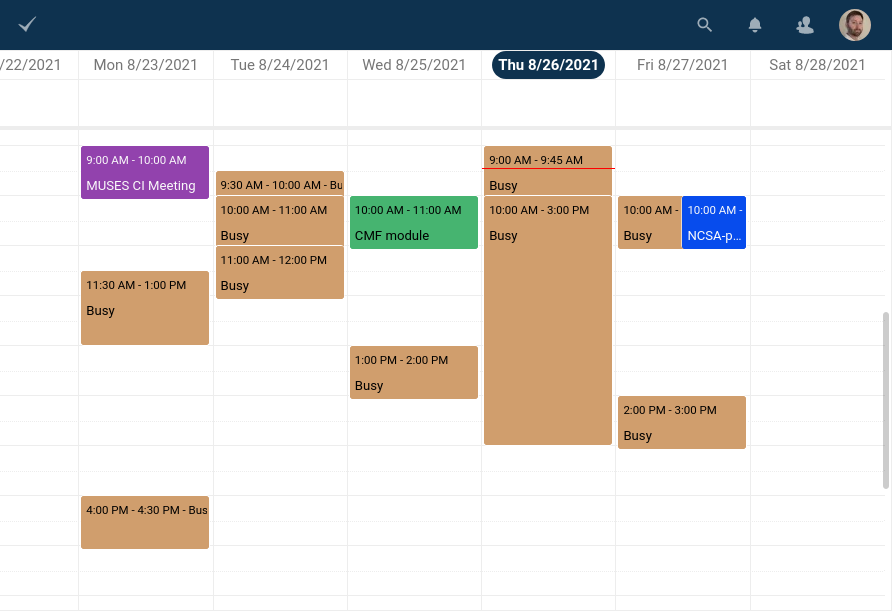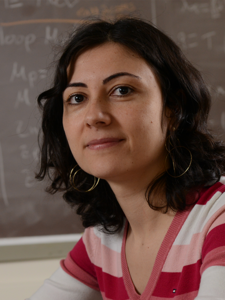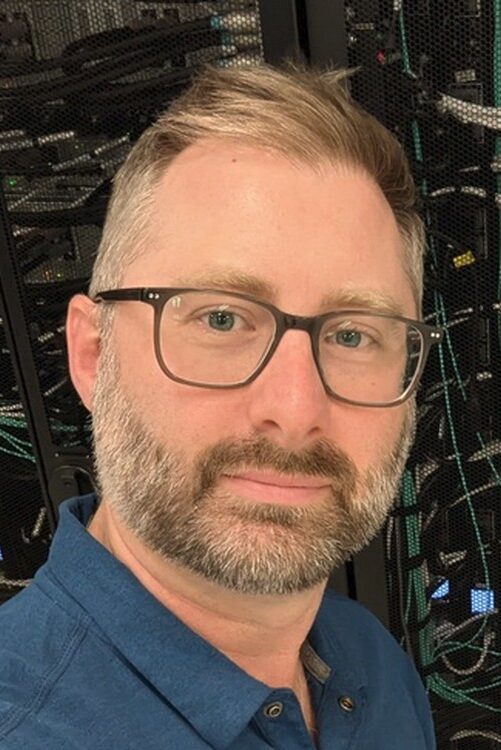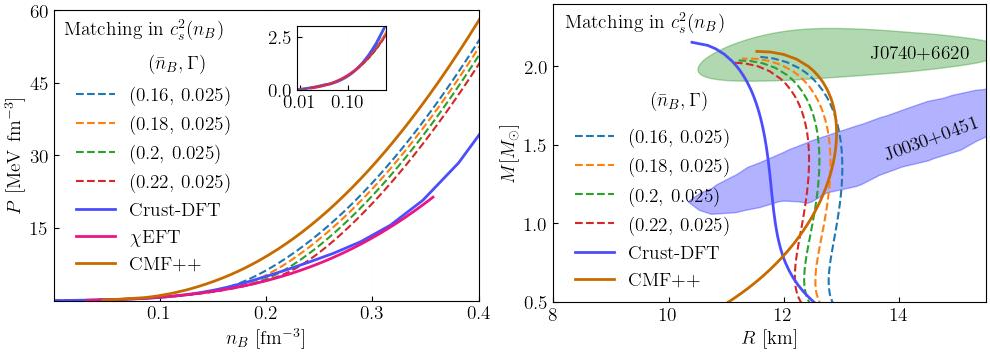WELCOME TO THE MUSES PROJECT
MUSES is an NSF-funded large collaboration project that provides the scientific community novel tools to answer critical interdisciplinary questions in nuclear physics, gravitational wave astrophysics, and heavy-ion physics by developing scientific software modules, deploying web applications to run data processing workflows at scale, and generating scientific data products.
DOCUMENTATIONUpdated & Integrated
Many of the existing calculation packages have a long and storied history, with unmaintainable code written in programming languages that have fallen from favor. Much of the initial work of MUSES is converting, rewriting, and upgrading these scripts to form the first code modules to be integrated into calculation packages that together will form the core Calculation Engine. Most of the code will be rewritten as high-performance C++ libraries that can be wrapped for use in other languages such as Python as desired.
Cloud-native & Scalable
The MUSES cyberinfrastructure is more than the Calculation Engine. We are building a cloud native deployment system based on the latest container technologies, leveraging the power of Kubernetes to create a reproducible environment compatible with a wide range of hosting platforms. Individuals and organizations can deploy their own MUSES on-premises, utilizing their own backend computing solutions and maintaining full control over their data.
COLLABORATIVE TOOLS
The MUSES collaboration consists of many researchers and technical professionals across dozens of institutions spread across the globe. We are building and using a collaborative platform designed for the demands of inclusive and vibrant scientific communities.
Click here to learn more about DecentCI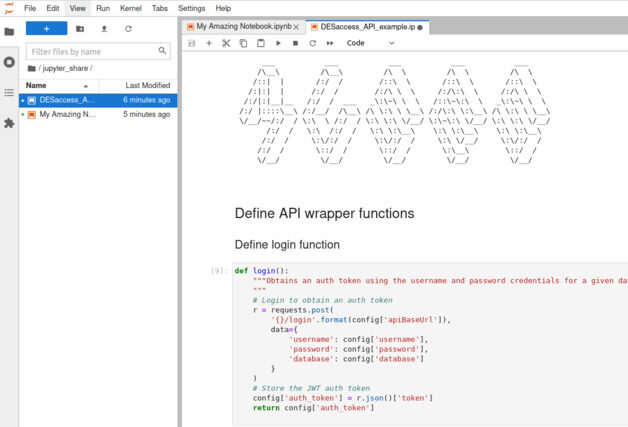
JupyterHub
Users can launch dedicated JupyterLab servers, providing a powerful platform to process data using the high-performance computers at NCSA. A custom Universal Worker Service API server provides asynchronous parallel processing via Kubernetes Jobs, with support for NCSA Delta coming soon.
(Collaborators only)
Organization & Leadership
The MUSES collaboration leadership structure is found on the MUSES Organization website hosted by the University of Illinois Physics department.
VIEW ALL MEMBERSRecent News
Building Neutron Stars with the MUSES Calculation Engine
Date: March 05, 2025
Title: Building Neutron Stars with the MUSES Calculation Engine
Authors: Mateus Reinke Pelicer, Nikolas Cruz-Camacho, Carlos Conde-Ocazionez, David Friedenberg, Satyajit Roy, Ziyuan Zhang, T. Andrew Manning, Mark G. Alford, Alexander Clevinger, Joaquin Grefa, Roland Haas, Alexander Haber, Mauricio Hippert, Jeremy W. Holt, Johannes Jahan, Micheal Kahangirwe, Rajesh Kumar, Jeffrey Peterson, Hitansh Shah, Andrew W. Steiner, Hung Tan, Yumu Yang, Volodymyr Vovchenko, Veronica Dexheimer, Jorge Noronha, Jaquelyn Noronha-Hostler, Claudia Ratti, Nicolás Yunes
Abstract: Exploring the equation of state of dense matter is an essential part of interpreting the observable properties of neutron stars. We present here the first results for dense matter in the zero-temperature limit generated by the MUSES Calculation Engine, a composable workflow management system that orchestrates calculation and data processing stages comprising a collection of software modules designed within the MUSES framework. The modules presented in this work calculate equations of state using algorithms spanning three different theories/models: (1) Crust Density Functional Theory, valid starting at low densities, (2) Chiral Effective Field Theory, valid around saturation density, and (3) the Chiral Mean Field model, valid beyond saturation density. Lepton contributions are added through the Lepton module to each equation of state, ensuring charge neutrality and the possibility of β-equilibrium. Using the Synthesis module, we match the three equations of state using different thermodynamic variables and different methods. We then couple the complete equation of state to a novel full-general-relativity solver (QLIMR) module that calculates neutron star properties. We find that the matching performed using different thermodynamic variables affects differently the range obtained for neutron star masses and radii (although never beyond a few percent difference). We also investigate the universality of equation of state-independent relations for our matched stars. Finally, for the first time, we use the Flavor Equilibration module to estimate bulk viscosity and flavor relaxation charge fraction and rates (at low temperature) for Chiral Effective Field Theory and the Chiral Mean Field model.
Read moreModern nuclear and astrophysical constraints of dense matter in a redefined chiral approach
Published on April 01, 2024
Title: Modern nuclear and astrophysical constraints of dense matter in a redefined chiral approach
Authors: Rajesh Kumar, Yuhan Wang, Nikolas Cruz Camacho, Arvind Kumar, Jacquelyn Noronha-Hostler, Veronica Dexheimer
Abstract: We explore the quantum chromodynamics (QCD) phase diagram’s complexities, including quark deconfinement transitions, liquid-gas phase changes, and critical points by using the chiral mean-field (CMF) model that is able to capture all these features. We introduce a vector meson field redefinition within the CMF framework, enabling precise adjustments of meson masses and coupling strengths related to vector meson interactions. Performing a new fit to the deconfinement potential, we are able to replicate recent lattice QCD results, low-energy nuclear physics properties, neutron star observational data, and key phase diagram features as per modern constraints. This approach enhances our understanding of vector mesons’ roles in mediating nuclear interactions and their impact on the equation of state, contributing to a more comprehensive understanding of the QCD phase diagram and its implications for nuclear and astrophysical phenomena.
Hot QCD phase diagram from holographic Einstein–Maxwell–Dilaton models
Date: November 30, 2023
Title: Hot QCD phase diagram from holographic Einstein–Maxwell–Dilaton models
Authors: Romulo Rougemont, Joaquin Grefa, Mauricio Hippert, Jorge Noronha, Jacquelyn Noronha-Hostler, Israel Portillo, Claudia Ratti
Abstract: In this review, we provide an up-to-date account of quantitative bottom-up holographic descriptions of the strongly coupled quark–gluon plasma (QGP) produced in relativistic heavy-ion collisions, based on the class of gauge-gravity Einstein–Maxwell–Dilaton (EMD) effective models. The holographic approach is employed to tentatively map the QCD phase diagram at finite temperature onto a dual theory of charged, asymptotically Anti-de Sitter (AdS) black holes living in five dimensions. With a quantitative focus on the hot QCD phase diagram, the nonconformal holographic EMD models reviewed here are adjusted to describe first-principles lattice results for the finite-temperature QCD equation of state, with 2+1 flavors and physical quark masses, at zero chemical potential and vanishing electromagnetic fields. We review the evolution of such effective models and the corresponding improvements produced in quantitative holographic descriptions of the deconfined hot QGP phase of QCD. The predictive power of holographic EMD models is tested by quantitatively comparing their predictions for the hot QCD equation of state at nonzero baryon density and the corresponding state-of-the-art lattice QCD results. Hydrodynamic transport coefficients such as the shear and bulk viscosities predicted by these EMD constructions are also compared to the corresponding profiles favored by the latest phenomenological multistage models simultaneously describing different types of heavy-ion data. We briefly report preliminary results from a Bayesian analysis using EMD models, which provide systematic evidence that lattice QCD results at finite temperature and zero baryon density strongly constrains the free parameters of such bottom-up holographic constructions. Remarkably, the set of parameters constrained by lattice results at vanishing chemical potential turns out to produce EMD models in quantitative agreement with lattice QCD results also at finite baryon density. We also review results for equilibrium and transport properties from magnetic EMD models, which effectively describe the hot and magnetized QGP at finite temperatures and magnetic fields with zero chemical potentials. Finally, we provide a critical assessment of the main limitations and drawbacks of the holographic models reviewed in the present work, and point out some perspectives we believe are of fundamental importance for future developments.


